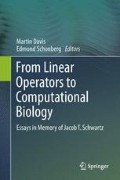Abstract
Participating in a group study of Karl Marx’s classic Capital led Jack Schwartz in unexpected directions. He was surprised to find, not only that Marx’s celebrated labor theory of value is in blatant contradiction to empirical reality, but also that Marx was quite aware of this. To get around this roadblock, Marx had returned to the Hegelian dialectic that he and Friedrich Engels had previously abandoned and even ridiculed.
I am grateful to Judith Dunford who read a draft of this article and made a number of very helpful suggestions.
Access this chapter
Tax calculation will be finalised at checkout
Purchases are for personal use only
Notes
- 1.
[9], p. 335.
- 2.
- 3.
See the obituary http://www.nytimes.com/2006/08/07/us/07bookchin.html.
- 4.
Of course this brief summary does not give an adequate account of Weber’s ideas. See also: http://www.bopsecrets.org/images/weber.pdf and http://en.wikipedia.org/wiki/The_Movement_For_a_Democracy_of_Content.
- 5.
- 6.
Joe’s article [15] was in #31 of CI dated October-November 1957, along with a brief article by my wife Virginia based on one of her KPFA broadcasts and an article by Jack on the dangers of nuclear experimentation.
- 7.
- 8.
[8], p. 837.
- 9.
See [9], pp. 298–301.
- 10.
I’m grateful to Diana Schwartz who provided me with a copy of this letter.
- 11.
[6], pp. 68–72.
- 12.
[3], p. 25.
- 13.
[12], p. 180.
- 14.
[9], p. 106.
- 15.
Engels’s unflagging support for Marx and his family continued for many years as the projected publication dates of the successive volumes of Capital receded into the future. See [7].
- 16.
[12], p. 102.
- 17.
[6], pp. 43–45.
- 18.
[11], p. 335.
- 19.
To emphasize the point, note that although 1×0=2×0, if it were permissible to divide both sides of this equality by 0, we would reach the absurd conclusion 1=2.
- 20.
[9], p. 57.
- 21.
[9], p. 165. Again the reference is to the German original; the translation is from the Internet.
- 22.
For a coherent account of the gradual development of a proper foundation for the calculus, see [2], pp. 260–273.
- 23.
See [5], pp. 298–301 for a description of the poor state of the papers from which Engels had to work in preparing Volume II and especially, Volume III.
- 24.
[1], p. 28.
- 25.
[10], p. 132.
- 26.
[4], p. 134.
- 27.
As I write, we are experiencing economic conditions arising in considerable part from reliance on the monetary theories of Milton Friedman, theories that were roundly criticized in Jack’s book [4].
References
Bell, E.T.: The Development of Mathematics. McGraw-Hill, New York (1940)
Berkeley, G.: In: The Analyst or a Discourse Addressed to an Infidel Mathematician. The Works of George Berkeley Bishop of Cloyne, Nelson, London/Edinburgh, vol. 4, pp. 53–102 (1948)
Davis, H.: Hegelianism in Marx, unpublished essay
Engels, F.: Herr Eugen Dühring’s Revolution in Science. Marxist Library, vol. 18. International Publishers, New York (1939)
Hegel, G.F.W.: Wissenschaft der Logik, Erster Band: Die Objektive Logik (1812/13). Gesamelte Werke, vol. 11. Felix Meiner Verlag, Hamburg (1978)
Hunt, T.: Marx’s General: The Revolutionary Life of Friedrich Engels. Henry Holt, New York (2009)
Lenin, V.I.: Philosophical Notebooks. Collected Works, vol. 38. Foreign Languages Publishing House, Moscow (1961)
Marx, K.: Value, Price and Profit. International Publishers, New York (1935)
Marx, K.: Capital: A Critique of Political Economy, vol. I. Modern Library, New York (1936)
Marx, K.: Capital: A Critique of Political Economy: The Process of Circulation of Capital, vol. II. Charles Kerr, Chicago (1915)
Marx, K., Engels, F.: Selected Correspondence. Marxist Library, vol. 29. International Publishers, New York (1935)
Marx, K., Engels, F.: The Holy Family, or Critique of Critical Criticism: Against Bruno Bauer and Company. Progress Publishers, Moscow (1975)
Schwartz, J.T.: Lectures on the Mathematical Method in Analytical Economics. Gordon and Breach, New York (1961)
Schwartz, J.T.: Theory of Money. Gordon and Breach, New York (1965)
Weber, J.: The great utopia. Contemp. Issues 2(5), 3–22 (1950)
Weber, J. [Wilhelm Lunen, pseud.]: The problem of social consciousness in our time. Contemp. Issues 8(31), 478–528 (1957)
Author information
Authors and Affiliations
Corresponding author
Editor information
Editors and Affiliations
Rights and permissions
Copyright information
© 2013 Springer-Verlag London
About this chapter
Cite this chapter
Davis, M. (2013). Jack Schwartz Meets Karl Marx. In: Davis, M., Schonberg, E. (eds) From Linear Operators to Computational Biology. Springer, London. https://doi.org/10.1007/978-1-4471-4282-9_3
Download citation
DOI: https://doi.org/10.1007/978-1-4471-4282-9_3
Publisher Name: Springer, London
Print ISBN: 978-1-4471-4281-2
Online ISBN: 978-1-4471-4282-9
eBook Packages: Computer ScienceComputer Science (R0)

